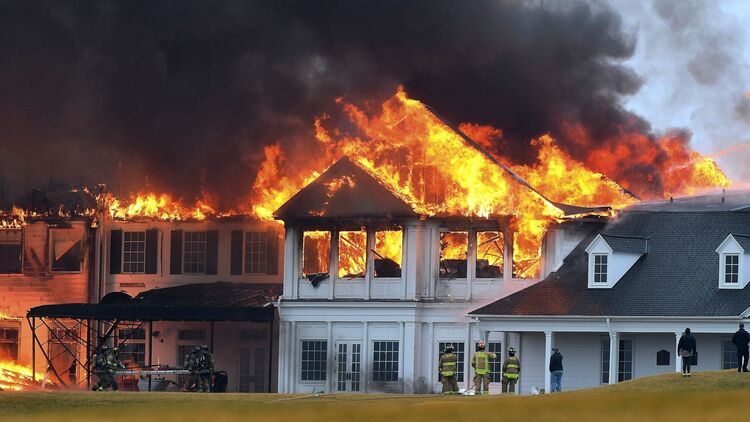
The Cost of Everything is Going Up, Potentially Leaving You Underinsured
By James Barr, Vice President
Everywhere we look, we see news about the impact inflation is having on the costs of goods and services. The insurance industry is certainly not immune, and neither are the businesses with commercial insurance.
At a minimum, the rising cost of everything will logically “trickle down” to the cost of doing business, including insurance premiums. In fact, “inflation” of insurance premiums is a standard occurrence each year to the tune of four to six percent annually. But for this year and the immediate future, we expect that rate of inflation to potentially double the historical average, meaning premiums will increase even more than we typically expect or budget for.
And that’s not nearly the half of it! The further implication of inflation is the danger it poses should the worst occur. Look no further than the tragic case of Oakland Hills Country Club as the most recent illustration of what’s at risk. While it’s likely that Oakland Hills’ risk managers, insurers and agents were well prepared, even for the worst, if it’s your business that would be so unfortunate as to have a significant loss today—under this current inflationary climate—you could find yourself significantly underinsured from a replacement cost standpoint.
Yes, it Can Happen to You
Oakland Hills was spending its time and energy planning for eight future PGA events that the country club was to host over the course of the next 29 years, including four major championships. It certainly wasn’t planning on undergoing a major recovery and restoration effort as the result of a fire. But these things can happen. To anyone. At any time.
If it were to happen now, the consequences could be even more dire. The cost of materials is skyrocketing. The cost of labor was already rising before inflation took hold and is only getting worse. The embedded costs of transportation of materials continues to soar, and is now compounded by a global event that has further disrupted an already strained supply chain.
The result? The replacement costs of recovering from a substantial loss, such as the one Oakland Hills endured, are entirely out of scale from what most businesses are currently insured for. On top of heightened inflation, recoveries from natural disasters like fire, flood or wind require urgent remediation from restoration contractors, so expect to add a “rush” premium to the cost of getting back to business to further escalate costs.
Also bear in mind that labor is scarce and expensive. It will cost more and take longer to repair, restore and recover. At risk of “piling on,” consider the further business interruption costs that could come as the result of such an event that we hope will never happen to us.
The end result: a business’s commercial insurance policies demand greater scrutiny than ever before. Nobody should be put in the position of dealing with a tragedy and being unprepared or underinsured, only to find out when it’s too late to do anything about it.
How to Protect Your Business, Assets and Future
Whenever a business shops for insurance, the tendency for the policyholder is typically to seek lower premiums. Insurance companies, by contrast, will advise for the highest replacement-cost coverage available to provide the client with the highest degree of protection against the worst possible outcomes. That conflict in objectives can sometimes lead to a push-and-pull when it comes to valuing the business and replacement costs in the event of a claim.
But now, with inflation here and likely to remain for the foreseeable future, that push and pull should be reassessed through the prism of today’s realities—the true cost of supplies, labor, materials and restoration. The last thing a business owner wants is to discover is that they are not fully covered for a significant loss or that the money needed to restore property or facilities is going to run out midway through an expensive restoration.
There are three things business owners should be doing right now to protect themselves against the unexpected:
Insist on current valuations of labor and supplies when determining insurance coverage. Not all insurance agents and carriers are using up-to-date calculations when valuing a business or its assets—factoring in current labor and material costs when determining replacement costs and limits. The resulting miscalculation could leave a huge gap between what you’re insured for and what it will cost to make the business whole again following a claim event.
Build additional coverage into the policy now. Many of our clients are surprised how far additional premium dollars will go towards increasing the limits and coverage. If there were ever a time to make sure your coverages are in line with potential losses and damages, it’s now. And the peace-of-mind and preventative protection that additional premium dollars bring the insured are usually well worth the investment in security.
Don’t wait for your renewal to reevaluate existing coverage and limits. Tragedies don’t wait until your next renewal to strike, nor should you wait until your policy renewal date to investigate whether you are adequately covered. Inflation is hitting hard and quickly. There is no cost to investigate your options. If your agent is not offering you the opportunity to have confidence in your existing coverage or explore opportunities for enhancement, they should be.
It may not have occurred to all business owners that inflation has even crept into their insurance policies and loss scenarios, but it has. With everything else on a business owner’s plate, it can be tempting to leave insurance matters to fate and hope for the best. But as the Oakland Hills Country Club case illustrates, tragedies like fires can strike at any time—whether businesses have planned for them or not!
At the end of the day, the best way to “fight fire” is actually to do so well before it happens.
